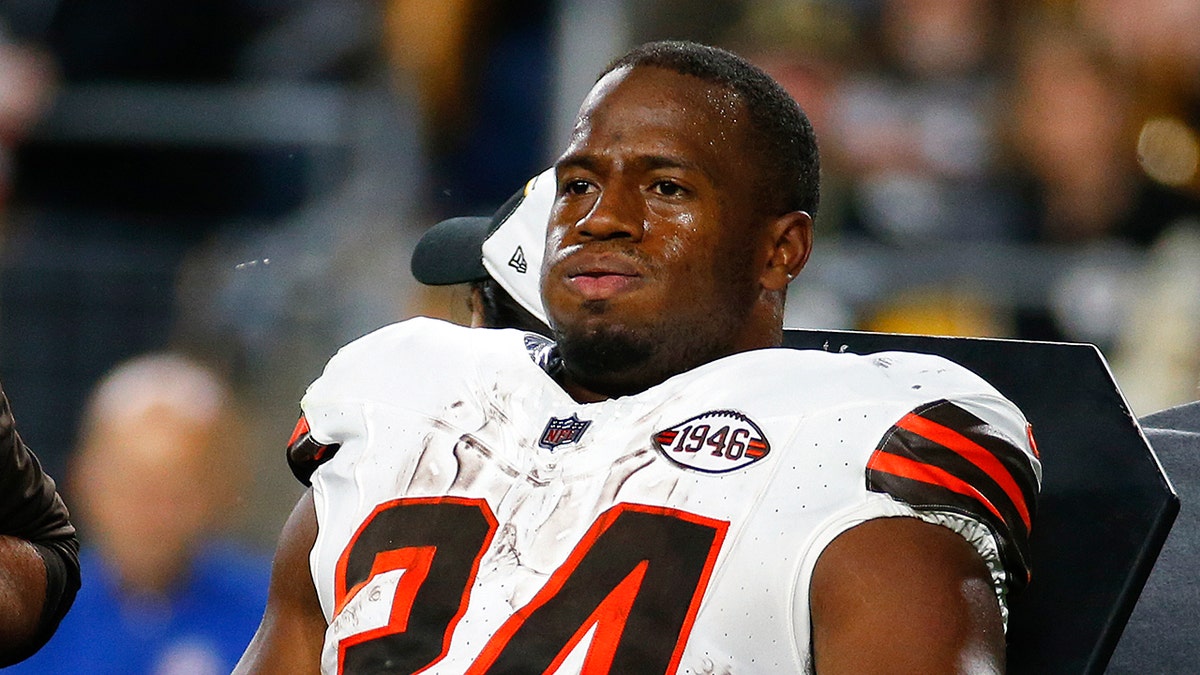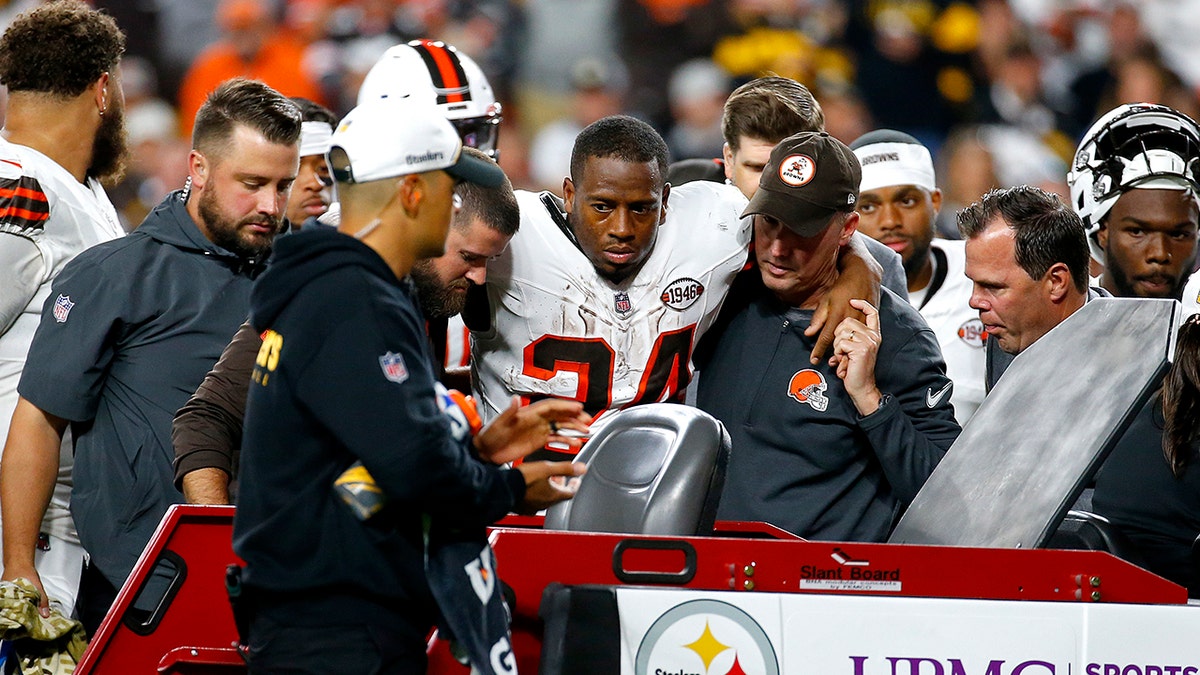Doctor of physical therapy says Nick Chubb has a long road ahead of knee injury
Tom Christ, doctor of physical therapy, gives insight into what's to come for Nick Chubb following his gruesome leg injury.
Nick Chubb's injury Monday night was one of the more distressing moments on a football field in recent memory.
The damage to his knee looked so gruesome ESPN opted not to replay the tackle on which he was hurt during its broadcast.
The Cleveland Browns were quick to say Chubb's season is likely over given it's a "significant" injury.
It's clear Chubb has his work cut out for him, but here's a reminder this is not Chubb's first serious injury to his left knee. He had a similar injury in 2015 at the University of Georgia.
CLICK HERE FOR MORE SPORTS COVERAGE ON FOXNEWS.COM

Nick Chubb of the Cleveland Browns is carted off the field after injuring a knee during the second quarter against the Pittsburgh Steelers at Acrisure Stadium Sept. 18, 2023, in Pittsburgh. (Justin K. Aller/Getty Images)
Tom Christ, a doctor of physical therapy who also co-hosts the "Fantasy Injury Team" podcast alongside Joe D'Amico, said assuming the severity of this injury is similar to the previous one, a return is even more difficult.
"If it's the same tissues that need to be repaired again, the quality of the tissue is not quite as good the second time around," Christ told Fox News Digital in a recent interview. "The younger you are, healing is much, much better. But this time around, being he's 27, and he's a running back, that's kind of getting up there in age for running backs anyway.
"There's definitely a possibility that that previous injury has led to not as ideal tissue quality for the healing and the repairing process, but he's got a lot of hurdles ahead of him to get back on the field."
Christ says Chubb is now a candidate for early onset arthritis, but with the amount of damage done to his knee, the toughest parts of the rehab are the very beginning and the very end.
"The protocol for what you can do post-operatively from the start, it's gonna change based on how many tissues are involved," Christ said. "Let's say [the meniscus] has to be repaired. You're gonna be limited in how much range of motion you can work in the first six weeks. Same with if a (posterior cruciate ligament) is involved. That's gonna really limit how much range of motion you can work early on.

Nick Chubb of the Cleveland Browns is carted off the field after sustaining a knee injury during the second quarter against the Pittsburgh Steelers at Acrisure Stadium Sept. 18, 2023, in Pittsburgh. (Justin K. Aller/Getty Images)
"Generally speaking, the more tissues involved, the slower the first six to eight weeks of rehab are from a range of motion standpoint. And when you're limited in how much range of motion you can go through early, sometimes you get scar development, which makes it very, very hard to ever regain motion."
TOM BRADY SHUTS DOWN IDEA OF RETURNING TO PLAY FOR JETS: 'NEXT QUESTION'
And while Chubb is a physical freak who can squat at least 675 pounds, regaining his original strength is going to be difficult.
"As he rehabs, he's gonna get a lot of that strength back, but it's the last bit of strength that's super hard to get. … His game is built off his power, right? That's gonna be really pivotal for him to get back to playing at an elite level in the NFL. It's not just to get to 80% of his unaffected size or strength, but to get as close to 100% as possible, and that takes a year-plus most of the time," Christ said.
The fact that Chubb plays the running back position also is going to affect his rehab in a negative way. Christ says wide receivers may actually have an easier rehab for such an injury because of the "nature of the position."

Nick Chubb of the Cleveland Browns speaks during a press conference after the Cleveland Browns' mandatory veteran minicamp at CrossCountry Mortgage Campus June 7, 2023, in Berea, Ohio. (Nick Cammett/Diamond Images via Getty Images)
"Running backs are more reactive. They are reacting to the holes that open, where the defenders are coming through, so it's a lot of stop and go, but not knowing when they're gonna stop and when they're gonna go again. Whereas receivers … it's much more predictable of a position than a running back is because running backs are really just reacting.
"The stop-and-go change of direction is the hardest part coming back from an ACL. … It's not nearly as hard to get your full 40-yard dash sprint speed back as it is to get your stop and go, react to a defender or whatever's going on on the field back. So, it's definitely harder for running backs than receivers."
CLICK HERE TO GET THE FOX NEWS APP
It's a tough road for Chubb. Christ notes that running backs normally decline at around age 29. And running backs see an average of a 35% decrease in production in their return from ACL injuries. If he returns fully healthy, he'll be close to the haunted age for running backs.
"Is his career over? I'm not gonna say that. Is it gonna be very hard for him to get back to playing elite football? Yes, it definitely will be," Christ said. "It's possible that he can be productive again in this league, but he's definitely got his work cut out for him."










































